[G7 Special 2] Global Health in the Post COVID-19 World
2023.05.18
At the G7 Hiroshima Summit, Japan will serve as the chair and lead discussions on various issues facing the international community. On the occasion of this summit, this series will focus on the current state of important global issues and future challenges, as well as Japan’s contribution and JICA’s cooperation activities in this area.
The theme of this second article in the series is “Global Health.” It has been three years since the beginning of the unprecedented COVID-19 pandemic. To prepare for the next infectious disease outbreak, we will look at the need for global health systems in the post-COVID-19 era.
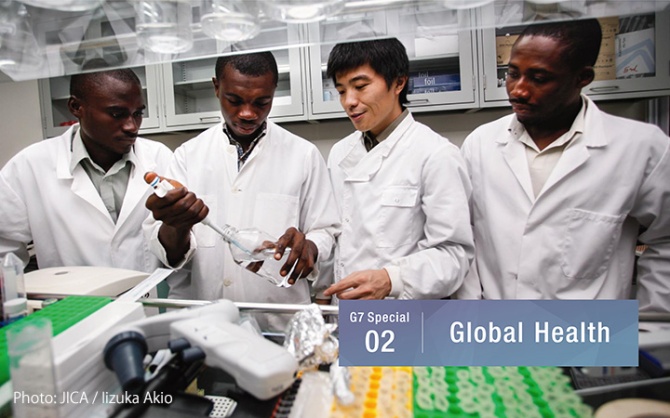
The COVID-19 pandemic that struck the world has had a tremendous impact on the international community. According to the World Health Organization (WHO), there have been 762.27 million cases of infection and 6.89 million deaths worldwide (as of April 2023).
In recent years, there have been other global pandemics, such as SARS (severe acute respiratory syndrome) and the Ebola virus disease, and countries’ countermeasures and frameworks for international cooperation were reviewed and strengthened after each outbreak, mainly by international organizations and respective governments. However, COVID-19, which spread quickly in low-, middle-, and high-income countries, was unprecedented, far exceeding the assumptions and measures based on past efforts.
In order to create a resilient society capable of addressing new infectious disease outbreaks and health crises, it is necessary to first strengthen health systems and preparedness for public health crises at the country level. At the same time, it is crucial to respond to infectious diseases that spread quickly by monitoring and reporting them, mobilizing funds, and ensuring access to vaccines on an international level. COVID-19 showed the need to approach pandemics on both international and country levels.
As the United Nations has stressed, “No one is safe until everyone is safe.” Without security at the country level, there is no international security, and vice versa.
In May 2022, the Japanese government launched a “Global Health Strategy” in preparation for the next crisis based on the lessons learned from COVID-19. The strategy consists of two policy goals that express Japan’s commitment to contributing to global health:
This strategy responds to the challenges of public health crises at both the international and country levels. The first policy goal, Global Health Architecture, refers to the mechanisms, organizations, and other facets of addressing global health issues. It includes setting norms for pandemics and mobilizing funds during infectious disease outbreaks, as well as ensuring equitable access to medicines and vaccines by engaging in their research and development, transferring their manufacturing technology, and distributing them.
Universal Health Coverage, or UHC, is positioned as the second policy goal, aiming to ensure that all people have access to needed health services of sufficient quality without suffering financial hardships. This includes efforts to improve the skills of health professionals, strengthen the capacity of communities, and secure financial resources. It is also essential to build a system that is resilient to health crises such as pandemics, guarantees equitable access to health services, and provides sustainable health financing that can respond to changes in society and evolving needs.
Japan, which established a universal health insurance system in 1961, has long demonstrated its leadership in international discussions and initiatives in the global health field. Since the late ’90s, Japan has taken advantage of the G7 summit meetings to play a leading role in combating infectious diseases, strengthening health systems, and promoting UHC.
Japan’s leadership is also underpinned by relationships of trust and networks with low- and middle-income countries built through years of cooperation by JICA. The agency aims to improve services such as maternal and child health and infectious disease control, and to strengthen overall health systems by developing its administrative capacity and human resources. JICA has provided detailed support from the policy and institutional level to that of service improvements in the field, while also respecting the ownership of the partner countries.
The necessity to prepare for public health crises during ordinary times was reaffirmed through the response to COVID-19. The impacts of JICA’s cooperation are tangible.
Ito Kenichi, Deputy Director General, and Group Director for Health Group 1, Human Development Department, said, “During this pandemic, while the marvelous ownership of and autonomous response by low- and middle-income countries has been remarkable, many of the partner organizations that JICA has supported have played central roles in their respective countries.”
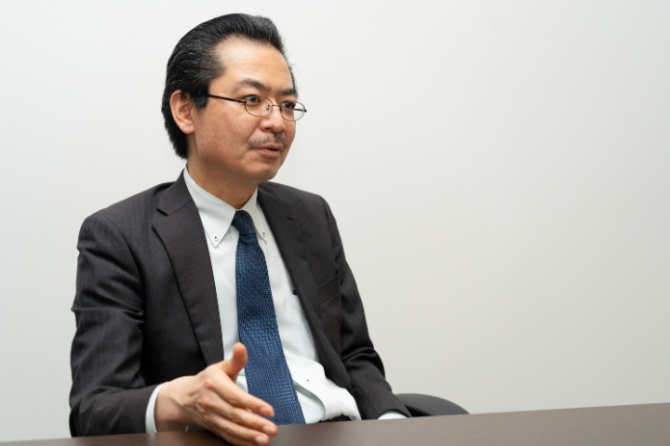
Ito Kenichi, Deputy Director General, and Group Director for Health Group 1, Human Development Department.
In Ghana, the Noguchi Memorial Institute for Medical Research (NMIMR) operated around the clock at the beginning of the COVID-19 pandemic. The institute was responsible for up to 80 percent of domestic PCR testing during the peak period, assisting in setting up PCR testing facilities in 40 locations around the country. In Kenya, the Kenya Medical Research Institute (KEMRI) performed half of the domestic PCR tests at the peak of infections. In southern Vietnam, the Cho Ray Hospital received the first patient in the country and provided technical guidance to 25 hospitals in the southern region on patient care and nosocomial infection control.
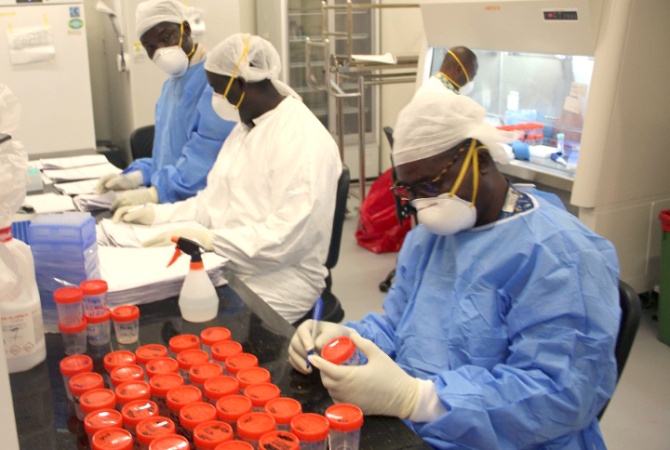
The Noguchi Memorial Institute for Medical Research in Ghana, which operated day and night, was responsible for 80 percent of PCR testing in the country.
A "third-country training program" was implemented in Africa before the COVID-19 pandemic, with NMIMR and KEMRI taking the lead in assisting neighboring countries. The two institutions provided training to West African and East African countries, respectively, to improve the techniques and skills of laboratory staff and strengthen the networks with target countries. Since the pandemic began, they have made significant contributions to neighboring countries’ testing systems through the addition of training content related to COVID-19 testing.
NMIMR has also collaborated on a regional basis by having lecturers sent from the Africa Centres for Disease Control and Prevention (Africa CDC) to a third-country training program conducted last year at NMIMR. The Africa CDC has played a leading role in the African region since its establishment in 2016 in the wake of the Ebola outbreak.
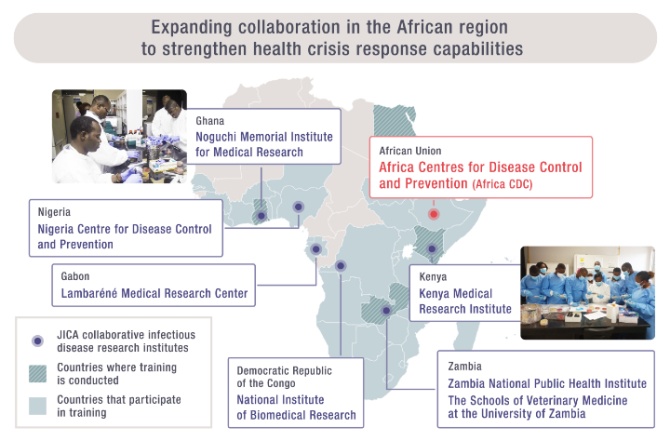
Global health challenges are not limited to infectious diseases. They include maternal and child health, non-communicable diseases (such as cancer and strokes), and aging-related issues. UHC is central to addressing these various health issues in a balanced manner. JICA tailors its cooperation to each region and country, with Senegal having achieved particularly significant results.
Deputy Director General Ito explains the background behind this. “The following two dimensions are essential in the achievement of UHC: quality health service delivery and the establishment of a sound health-financing system in which society shares the burden of health expenditure,” he said. “In Senegal, we cooperate in both dimensions and encourage dialogue between the health-related ministry/agency and finance-related ministries. It is difficult to secure financial resources solely through the efforts of the former."
The government’s strong commitment has been a driving force in Senegal, with the number of people living in poverty enrolling as beneficiaries in community health insurance increasing from 185,000 in 2015 to 1.14 million in 2019. This kind of cooperation for achieving UHC has also been extended to Kenya, Egypt, and other countries.
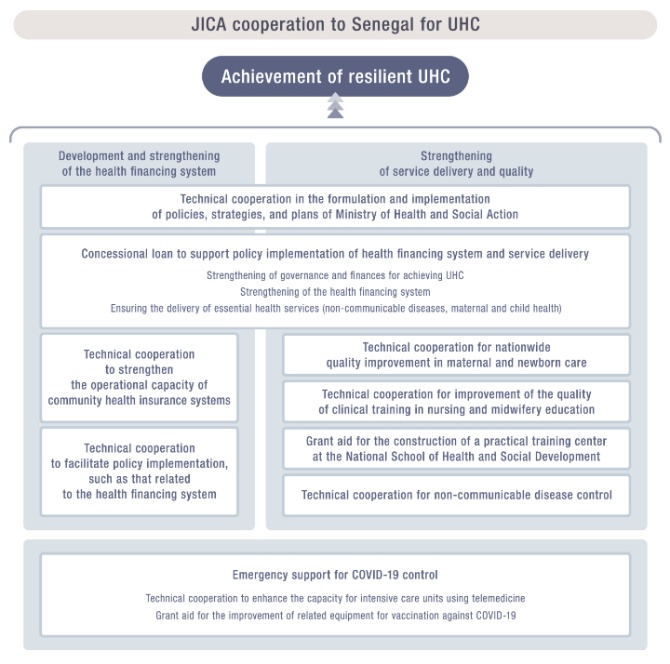
It is important to strengthen frameworks on a regional basis in order to complement country-based efforts and enable rapid and appropriate assistance for fragile states. The Africa CDC was active during the height of the pandemic, procuring and distributing PPE (personal protective equipment to prevent infection) and vaccines, which were in short supply. ASEAN is now in the process of establishing the ASEAN Centre for Public Health Emergencies and Emerging Diseases to strengthen the public health crisis response in the region. In the future, region-based efforts could be linked, for example, to the formation and strengthening of a global network for infectious disease surveillance, thereby contributing to enhancing global health architecture.
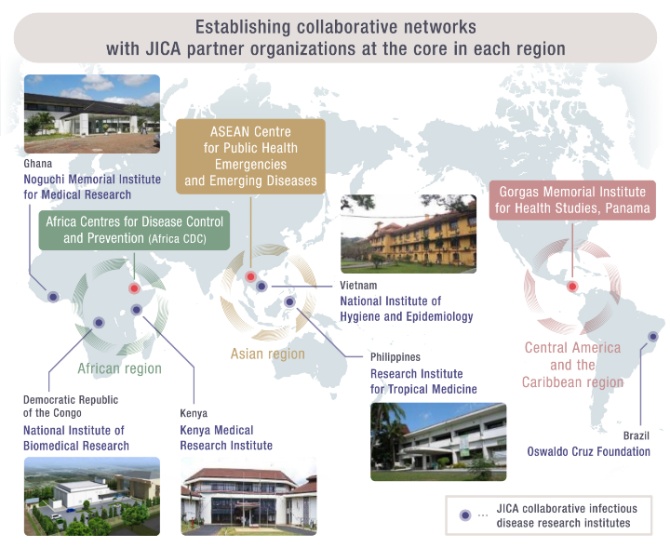
For many years, JICA has supported Ghana’s NMIMR and Kenya’s KEMRI. The two institutes are designated as regional hubs for pathogen genomic surveillance in Africa, as envisioned by the Africa CDC. In Latin America, JICA is also working with the Gorgas Memorial Institute for Health Studies in Panama on human resource development for neighboring countries in the Central American region, while supporting the institute in pathogen genomic surveillance in the wake of the COVID-19 pandemic. In Asia, JICA has conducted an early online training course on public health crisis management targeting health ministries of each country and ASEAN Secretariat officials who are expected to be involved in the future ASEAN Centre for Public Health Emergencies and Emerging Diseases, which will be the core of the region's response to infectious diseases.
If rapid analysis and sharing of pathogen genomic data with the international community can be facilitated from the Asian, African, and Latin American regions, rapid vaccine and medicine development can be boosted. However, support from public organizations such as JICA is not enough on its own. The formation of an international network of clinical research collaborations in industry, government, and academia, chiefly in Asia, is also underway to promote the rapid development of vaccines and therapeutics by Japanese pharmaceutical companies and others.
Japan’s contribution to global health in collaboration with the international community is expected to lead to global stability and peace, while at the same time protecting the safety of Japan and its people. In this post-COVID-19 era, the international community and Japan should join hands in realizing a society in which everyone can live in good health, through collective efforts by industry, government, and academia.
scroll